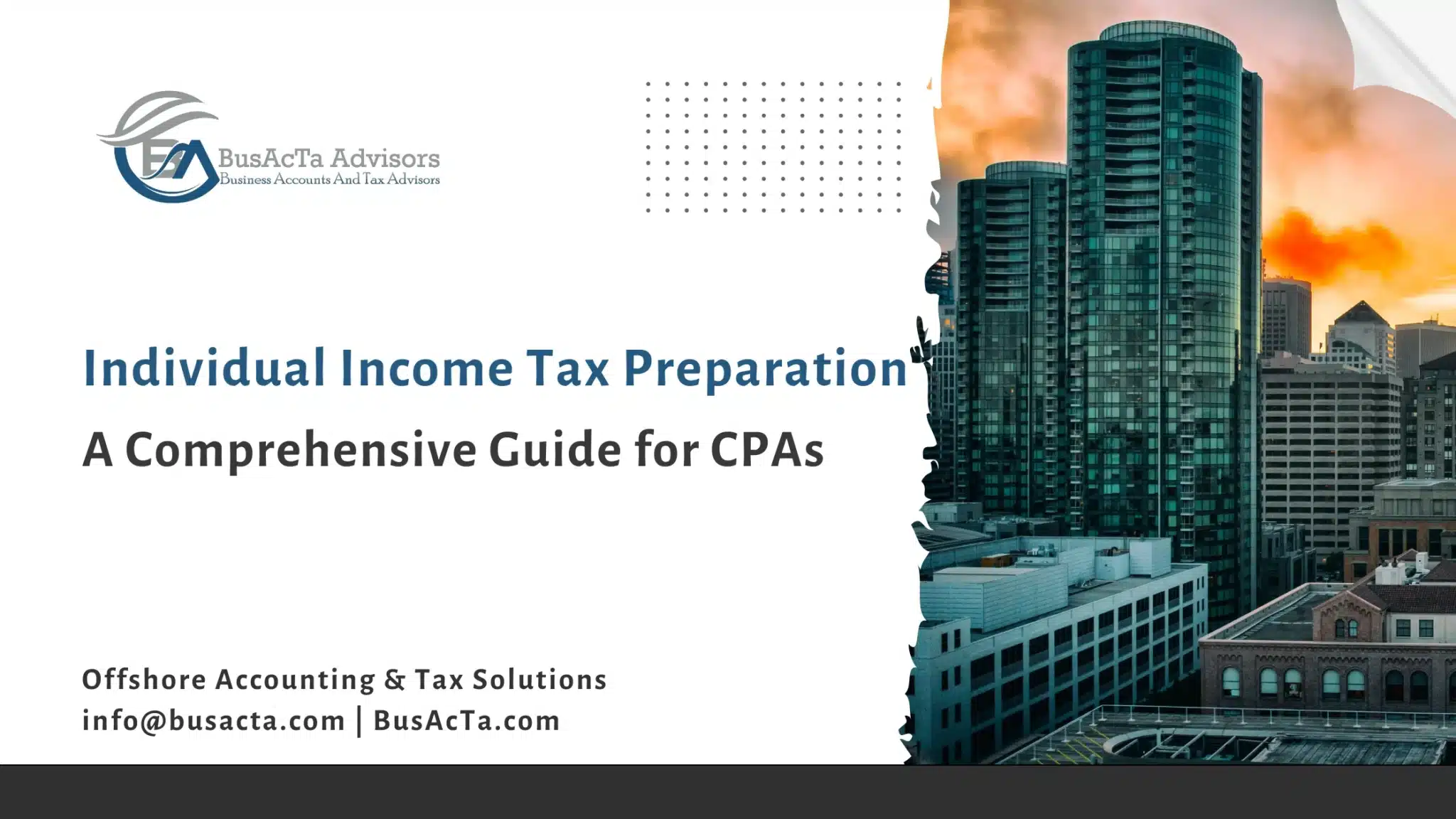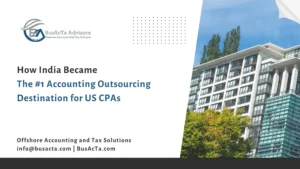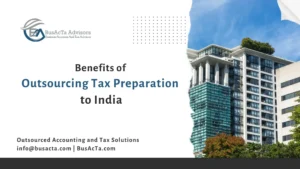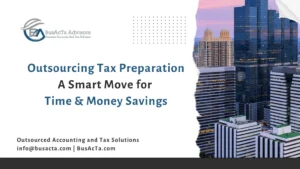Certified Public Accountants (CPAs) assist people with the complicated U.S. tax system. They help prepare personal tax returns. Many Americans rely on CPAs yearly to confirm their tax filings are correct and comply with IRS regulations.
In the context of CPA firms, personal tax preparation needs a meticulous, detail-oriented focus. It further demands an extensive familiarity with tax rules,deductions, and exemptions.
This article will discuss the personal tax return filing process and CPAs’ issues. It will additionally investigate how outsourcing may improve effectiveness.
What is Personal Tax Return Composition?
Making personal tax returns calls for compiling and arranging financial information, computing tax liabilities, and ensuring people satisfy their tax responsibilities by turning in correct returns to the IRS.
- An individual’s income, deductions, credits, and finally computed taxes payable or refund due are reported on a personal tax return that they file to the IRS.
- Personal tax return preparations call for the 1040 (U.S. Individual Income Tax Return), W-2 (Wage and Tax Statement), and 1099 forms (Income from self-employment, interest, dividends, etc.).
Accurate personal tax returns guarantee that people minimize their tax obligation or maximize their refund, avoiding fines.
How CPAs Help with Personal Tax Preparation?
CPAs ensure that their client’s tax returns are prepared correctly and completely. Their expertise assists clients in increasing deductions and managing tax issues. It also makes sure that all tax rules are followed.
- CPAs should review income statements, tax filings, and other financial papers.
- They are responsible for identifying and applying legal tax-saving strategies such as credits and deductions.
- The client’s economic situation affects how complex personal tax preparation is. Diverse income sources, assets, or self-employment yield more complex tax returns than simpler circumstances.
The primary goal of a CPA when preparing personal tax returns is to ensure accuracy and reduce tax liabilities. This approach also provides clients with a feeling of safety.
Key Steps in Getting Ready for Personal Tax Returns
CPAs can maintain accuracy and efficiency during tax season using a well-defined strategy. The key steps to prepare a personal tax return are:
1. Gathering and arranging client paperwork:
- Clients must give key financial details, such as W-2 forms, 1099 forms, and proof of any credits or deductions.
- CPAs must verify that all income and expenses are accurately noted to prevent any errors in the tax return.
2. Filling out the Necessary Forms:
- Based on the provided information, CPAs must accurately fill out suitable tax forms, like Form 1040.
- Clients with special circumstances, such as self-employed people or those with investment income, might require particular forms.
3. Analysis of Deductions and Credits:
- You must recognize helpful deductions like medical costs, donations, and mortgage interest.
- The EITC, child tax credit, and education credits are key tax benefits for CPAs.
4. Determining Tax Refunds or Amount Owed:
- CPAs review the collected information to determine if the client has tax obligations. They also verify if the client is eligible for a refund.
- A proper estimate guarantees clients the right refund amount and helps prevent underpayment penalties.
5. Helping Clients Meet the Deadline for Personal Tax Returns:
- The typical deadline for filing personal tax returns is April 15th each year. Yet, there are some situations where this date might be different.
- CPAs must ensure clients submit their filings on time to avoid penalties and interest fees.
Typical Difficulties in Individual Tax Filings
Throughout the personal tax return preparation process, CPAs face different difficulties—especially for clients with complicated financial circumstances:
1. Dealing with Complicated Tax Problems
- The tax preparation process might be more challenging depending on self-employment, investment income, rental properties, and several sources of income.
- CPAs must keep up with tax laws to ensure precise compilation of these forms.
2. Regulating changes in tax laws:
- Ongoing changes in tax laws require CPAs to be knowledgeable to guarantee compliance with current IRS standards.
- Failing to consider new laws might result in erroneous returns or unclaimed deductions.
3. Managing Client Expectations:
- Clients frequently hold unrealistic expectations regarding their tax refunds. CPAs must communicate effectively to align these expectations and avoid disappointment.
Benefits of Hiring Someone to Handle Your Tax Return Filing
Many CPA firms consider outsourcing tax preparation a wise choice, particularly during the busy tax season. Understanding the benefits of hiring someone for personal tax preparation can assist:
- Reduce Workload: Using outside vendors for basic tax preparation helps CPA firms reduce the pressure during tax season. This allows them to focus on more complicated client requirements. It also allows in-house staff to manage more detailed customer interactions and issues.
- Affordable:Outsourcing tax preparation helps CPA firms save money on hiring full-time tax preparers. They can hire outside experts for part-time or seasonal tasks instead.
- Access to Information:Outsourcing firms often focus on tax preparation and stay updated on the latest tax laws and software. This ensures accuracy and IRS compliance conformance.
- Flexibility:CPA firms can expand their business by outsourcing tasks to handle rising customer demand without overloading their internal staff. This approach is particularly effective during the busy tax season.
Handling Deadlines for Personal Tax Returns
Meeting personal tax filing deadlines is important to avoid incurring fines and interest. CPA firms must apply proper time management techniques to ensure all returns are filed on schedule.
1. Create a Strategy:
- CPAs should determine when to receive documents, complete tax filings, and submit them to the IRS.This prevents mistakes and last-minute stress.
2. Use Tax Preparation Software:
- Using tax preparation tools can reduce mistakes and make filing faster.
- The software also helps CPAs stay organized by sending automatic reminders for important deadlines.
3. Connect with Clients:
- Consistent communication with clients helps them send in required documents promptly. Supplying detailed guidelines and checklists makes it easier for clients to identify what they need for their tax returns.
Comparing Outsourcing and In-House Tax Preparation
CPA firms must evaluate the benefits and drawbacks of outsourcing tax preparation compared to in-house.
1. Outsourcing Advantages
- CPA firms benefit from outsourcing tax preparation by gaining access to skilled workers, minimizing costs, and increasing flexibility. It gives them the ability to use key tools without requiring full-time hires.
- By handling routine tax tasks, outsourcing firms enable CPAs to concentrate on more advanced client needs.
2. Advantages of Preparing Internally
- CPA firms can conduct tax preparation on-site. This method helps them create deeper bonds with their clients.
- It’s advantageous for firms with the workforce and resources to manage tax preparation continually.
Key Considerations for CPAs Offering Personal Tax Return Services
CPA firms should contemplate several variables when preparing personal tax returns for their clients.
1. Pricing Structure:
- CPAs must set distinct fees for personal tax preparation services since each client’s financial condition may be intricate. In this manner, clients can know what expenses to expect.
2. Customer Correspondence:
- Healthy client relationships hinge on trust and continuous communication. Clients should know their expenses and what to expect during the tax preparation.
3. Service Marketing:
- Supplying bespoke personal tax preparation services helps CPA firms set themselves apart in the marketplace. Endorsing these services to clients needing specialized care boosts their competitive leverage.
Conclusion:
A key service offered by CPA firms is preparing personal tax returns. This task needs careful attention, strong organization, and extensive knowledge. CPAs must ensure that their client’s tax returns are accurate and submitted on time.
This is crucial due to the difficulties of changing tax laws and complicated financial situations. Many CPA firms are now outsourcing tax preparation to manage their workload better. It improves efficiency, particularly during tax season.
CPAs can provide important personal tax preparation services by using the guidance in this book. These services are designed to meet the specific needs of clients. They also help clients navigate the complex world of personal taxes.
Do you need help with preparing your tax returns? Reach out to our experts at Busacta and manage all your tax preparation smoothly with us.





